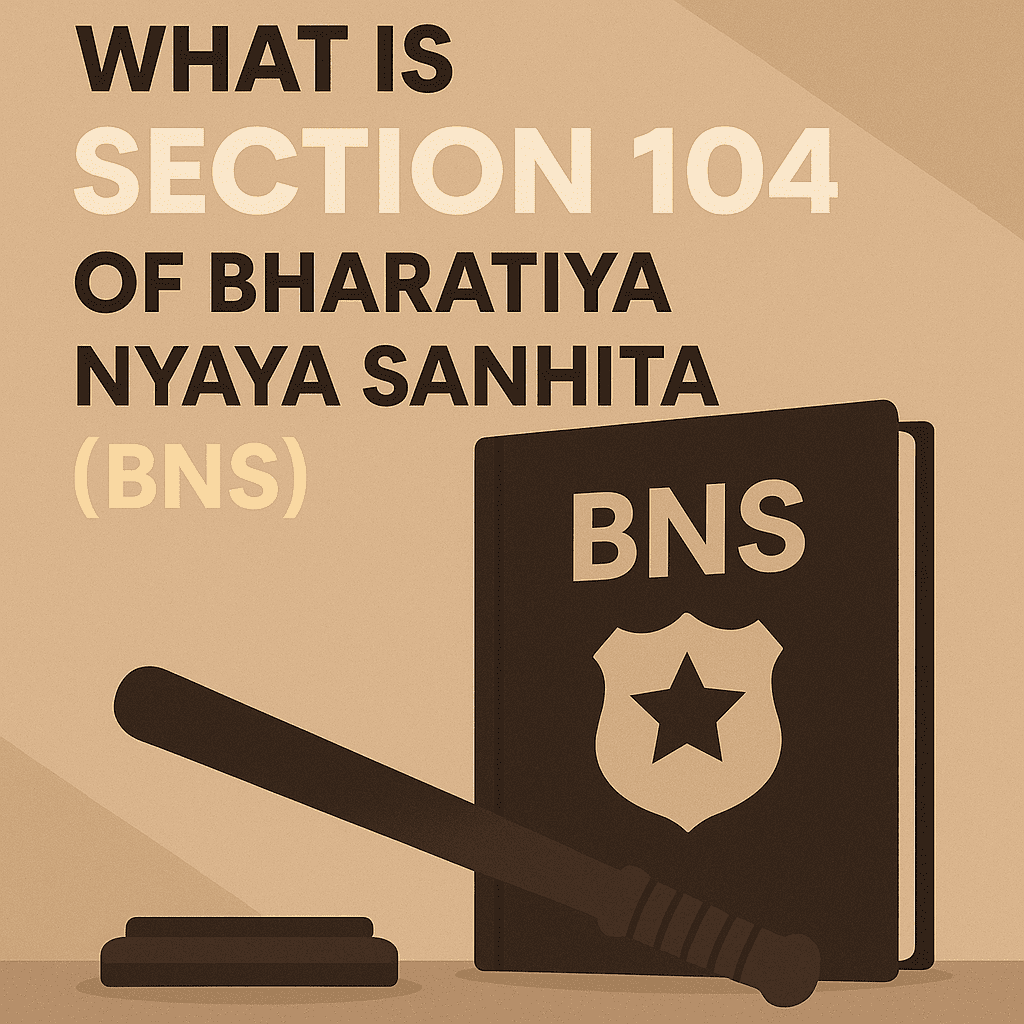What is Section 104 of Bharatiya Nyaya Sanhita (BNS)?

Section 104 of the Bharatiya Nyaya Sanhita (BNS) represents a transformative development in India's criminal law landscape, brought forward as part of the sweeping legal reforms replacing the Indian Penal Code (IPC). The BNS, established to modernize and streamline Indian criminal statutes, introduces Section 104 as a pivotal provision addressing the offence of culpable homicide not amounting to murder. Understanding Section 104 of Bharatiya Nyaya Sanhita is essential for legal professionals, accused individuals, and anyone interested in the updated penal framework governing serious criminal offences in India.
Section 104 BNS outlines the legal parameters under which an individual can be prosecuted for causing death with criminal culpability, without meeting the threshold of murder. In legal terms, it covers situations where a person causes death through an act intended to inflict bodily harm likely to result in death, or done with the knowledge that such harm could cause death, but where there is no direct intent to kill. The section is built upon the principle of distinguishing between murder and lesser degrees of homicide, thus providing a graded approach to charging, defending, and sentencing such cases. This is crucial for upholding the ideals of justice, proportionality, and due process in criminal trials.
One of the most significant features of Section 104 of BNS is its precise definition of "mens rea" (criminal intent) and the specification of various examples and circumstances that help courts interpret the accused's state of mind. The provision incorporates modern language and standards, clarifying ambiguities that historically existed under the erstwhile Section 304 of IPC. The penalties under Section 104 BNS are also calibrated to reflect the seriousness of the offence, with potential punishments including extended terms of imprisonment or, in severe circumstances, a term up to life. However, the BNS enables courts to exercise greater discretion by allowing consideration of mitigating or aggravating factors based on the circumstances of each case.
From a procedural perspective, Section 104 of Bharatiya Nyaya Sanhita also brings clarity to the bailability and compoundability of offences. Typically, such cases are non-bailable due to the gravity of the outcome, and they are not compoundable, ensuring that matters impacting public justice and victim rights are adjudicated through due process rather than private settlement. Section 104 BNS aligns Indian criminal law with contemporary global standards while reflecting Indian social realities and the need for an accessible, comprehensible, and fair penal system.
If you or your family are facing legal proceedings under Section 104 BNS or require expert advice on criminal defence and procedural strategies, contact Vakeel Saab. The experienced team at Vakeel Saab understands the nuances of the new Bharatiya Nyaya Sanhita, ensuring clients receive accurate legal representation tailored to the evolving criminal law landscape. Visit www.vakeelsaab.com or call +91 72848 72848 for a consultation and proactive legal solutions.
Frequently Asked Questions
Q1: What does Section 104 of Bharatiya Nyaya Sanhita criminalize? Section 104 BNS addresses culpable homicide not amounting to murder, penalizing acts where death occurs due to intentional or knowledgeable actions that fall short of the definition of murder.
Q2: How is Section 104 BNS different from Section 304 IPC? Section 104 BNS uses updated language for clarity on intent and causation, incorporates modern sentencing practices, and provides detailed illustrations, improving upon the broader framework of Section 304 IPC.
Q3: Is an offence under Section 104 BNS bailable? Generally, offences under Section 104 BNS are non-bailable due to their severity, but courts may consider bail based on case circumstances and judicial discretion.
Q4: Can an offence under Section 104 BNS be settled privately (compoundable)? No, these are non-compoundable offences because they involve serious injury or death, which the justice system adjudicates publicly rather than through private settlement.
Q5: What types of acts fall under Section 104 BNS? Acts causing death by inflicting serious bodily injury without direct intent to murder, but with knowledge or intent to cause harm likely to result in death, are typically covered.
Q6: Does Section 104 BNS offer sentencing flexibility? Yes, courts retain discretion to consider aggravating or mitigating circumstances, tailoring punishment to the facts of each case.
Q7: Who should consult a lawyer for Section 104 BNS matters? Anyone accused, investigated, or affected by a case involving Section 104 BNS should seek immediate legal counsel to understand rights, defences, and procedural options.
Q8: What evidence is crucial for defending a Section 104 BNS charge? Strong defence relies on clear evidence of intent, the cause and nature of injuries, eyewitness accounts, and other facts that may demonstrate lesser culpability or extenuating circumstances.
Q9: How do recent criminal law reforms impact Section 104 BNS? Recent reforms prioritize clarity and fairness, so courts may interpret Section 104 BNS with new focus on proportional sentencing and precise legal standards.
Q10: Where to get expert criminal law help for Section 104 BNS? Reach out to Vakeel Saab at www.vakeelsaab.com or call +91 72848 72848 for professional criminal defence and guidance on navigating cases under the latest Indian criminal laws.
Tags:Section 104 Bharatiya Nyaya Sanhita, Section 104 BNS, BNS criminal law, culpable homicide BNS, difference between Section 104 BNS and Section 304 IPC, Section 104 BNS bailable, Section 104 BNS compoundable, new Indian Penal Code, criminal lawyer BNS, Bharatiya Nyaya Sanhita explained, Vakeel Saab legal help, legal reforms India, BNS sentencing, non-bailable offences BNS, criminal defence lawyer India
Related Articles
The Importance of Consulting a Property Lawyer for Real Estate Issues
Blog
How to File a POCSO Complaint in India: Step-by-Step Legal Process
Blog
What punishments does the law give for giving, taking, or asking for dowry?
Blog
Reasons for the Increasing Divorce Rates in India
Blog
What is a Special Leave Petition? Meaning, Features, Process & & Who Can File?
Blog
What Is the Difference Between Mutual Divorce and Contested Divorce?
Blog